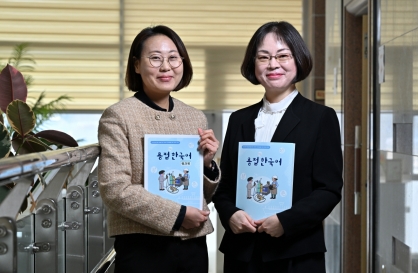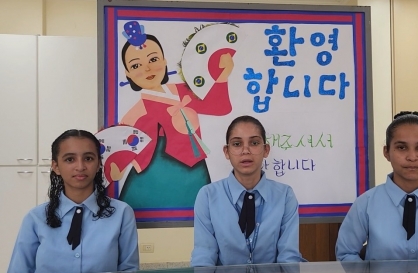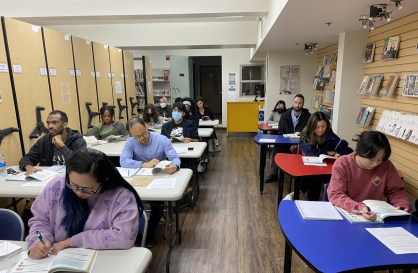Most Popular
Hello Hangeul
-
1
Welding book first in vocational Korean series for foreign labor

-
2
[Korea Beyond Korea] In Sao Paulo, horizons expand for Korean studies
![[Korea Beyond Korea] In Sao Paulo, horizons expand for Korean studies](//res.heraldm.com/phpwas/restmb_idxmake.php?idx=644&simg=/content/image/2023/11/20/20231120000619_0.jpg&u=20231206104853)
-
3
In Brasilia, worldly dreams are born from Korean classes

-
4
Americans seeking to visit Korea learn the language in LA

-
5
[Korea Beyond Korea] Berlin, Europe's Korean Studies hub, nurtures next-gen experts, scholars
![[Korea Beyond Korea] Berlin, Europe's Korean Studies hub, nurtures next-gen experts, scholars](//res.heraldm.com/phpwas/restmb_idxmake.php?idx=644&simg=/content/image/2023/10/18/20231018000929_0.jpg&u=20231023154735)
[Hello Hangeul] The complications of the 'one-inch' barrier
Experts and content industry insiders believe more can be done to offer greater cultural experience for international audiences
By Lee Si-jinPublished : Jan. 8, 2023 - 16:15

The following series is part of The Korea Herald’s “Hello Hangeul” project which consists of interviews, in-depth analyses, videos and various other forms of content that shed light on the stories of people who are learning the Korean language and the correlation between Korea’s soft power and the rise of its language within the league of world languages. – Ed.
Oscar-winning director Bong Joon-ho made headlines by using his acceptance speech at the 2020 Golden Globes to call on viewers to "overcome the 1-inch barrier of subtitles to experience more amazing projects."
Two years later, Netflix’s “Squid Game” confirmed the arrival of Korean drama craze across the globe.
With local projects picking up popularity on global streaming services, distributors are seeking to offer quality translation that allow the viewers to laugh and cry at all the right moments.
Many Korean dramas and films have earned more-than-expected attention from the audience over the past few years, with fans from around the world discussing even the details of the subtitles.
Recognizing its rising importance, content industry insiders continue efforts to provide quality subtitles. But they seem to fall short of satisfying the zealous, passionate Korean pop culture fans, who argue that several programs have dialogue that gets lost in translation.
Issues seem minor, but noteworthy
A month after the global release of "Squid Game" on Netflix, American comedian Youngmi Mayer, who is fluent in Korean, tweeted that the viewers may have watched a different series, if they watched the survival drama series with English subtitles.
Mayer, a co-host of podcast "Feeling Asian," emphasized problems with the translation of some of debt-ridden character Han Mi-nyeo's lines.
The comedian explained that one of Mi-nyeo’s lines, in which she says “I am not a genius, but I still got it worked out. Huh,” actually means “I am very smart. I just never got a chance to study.” Mayer added that the line is a famous pun in Korean media and succinctly explains the character’s brash behavior.
Mayer was commenting on closed caption subtitles -- designed for people who have difficulty hearing. These were based accurately on the transcript of the version of the drama with English-dubbing, which faces translation constraints because dialogue has to match each character's speaking time.
Netflix also offers conventional subtitles with a more accurate translation, but critics pointed out that deaf and hearing-impaired viewers should also have access to well-translated subtitles.

“I was a bit surprised to know that some famous Korean shows, which offer English subtitles, carry small mistranslations,” said a Taiwanese Disney+ viewer who wished to be identified by his surname Chen.
“I learned from my Korean friend that the expression ‘kkolgabtteonda’ meant ‘don’t be so ridiculous’ or ‘don’t be such an ass!’ I didn’t know that it was a slang with a cynical nuance," Chen told The Korea Herald. "Disney+’s ‘The Zone: Survival Mission’ translated that line into ‘give me a break,’” Chen said.
He said that while not all of subtitles are mistranslated, he feels there is still room for improvement, especially as someone who takes an interest in Korean language and expressions.

Meanwhile, some viewers expressed satisfaction for the Korean-to-English translation in various Korean content, including “Extraordinary Attorney Woo,” a legal drama series.
Mentioning the iconic self-introduction of female lead Woo Young-woo (played by Park Eun-bin) -- “My name is Woo Young-woo, whether it is read straight or flipped. Kayak, deed, rotator, noon, racecar, Woo Young-woo” -- a 30-year-old German drama fan surnamed Hofmann felt the series’ Korean-to-English translation was more than satisfactory.
“After a few episodes, I learned that what Woo was speaking in Korean meant goose, tomato, Switzerland, an Indian person and shooting star, which make palindromes in Korean. I think the translation, which holds different meaning to Park Eun-bin’s original line, made many fans to look up for the real definitions,” the drama fan said.
“Many of them would have burst out laughing after realizing shooting star in Korean can also be shitting star,” Hofmann jokingly added.
What is next for subtitles?

Many experts and content industry insiders believe that various attempts can be made to allow global fans truly enjoy Korea's creative content and learn about the country’s culture.
Kim Kyung-hye, a professor at Shanghai International Studies University, said that the role of subtitles can be expanded from merely providing literal translations.
“Player 456, or Gi-hun (played by Lee Jung-jae), in ‘Squid Game’ repeatedly addresses Cho Sang-woo (played by Park Hae-soo) as a Seoul National University graduate and pride of Ssangmun-dong,” the professor said.
“Korean viewers will have no problem understanding what it means to be an SNU graduate in Korea. But foreign viewers might wonder why the character is putting so much emphasis on that line in multiple episodes. A small explanation about the line could have been helpful to understand the series at a higher level,” Kim explained.
Others think that the fan-oriented subtitles serviced on Rakuten Viki or the collaboration on subtitles with live chat service can be ways to expand intercultural understanding.
In an attempt to enhance the viewer experience, many streaming platforms are embracing artificial intelligence to break the language barrier, quickly deliver accurate translation and allow wider audience to enjoy foreign projects to their fullest.
Tim Jung, CEO of the AI machine translation front-runner XL8, explained that the subtitles created by his company allow the human translator to focus more on localization.
“Post editing is done by human translators, allowing them to spend more time in making appropriate subtitles for different countries and their cultures,” Jung said via email.
But he said that the current machine translation, which performs at a high school student level, will develop at a fast pace, making even the human translator in the post editing stage unnecessary in the next three to five years.
“I agree that the art of translation still requires human creativity," said Jung, adding, "But I predict that depending on the degree of difficulty and the need, there will be, in the future, more projects that do not require human translators."










![[Weekender] Korea's traditional sauce culture gains global recognition](http://res.heraldm.com/phpwas/restmb_idxmake.php?idx=644&simg=/content/image/2024/11/21/20241121050153_0.jpg&u=20241123224317)

![[Korea Beyond Korea] In Sao Paulo, horizons expand for Korean studies](http://res.heraldm.com/phpwas/restmb_idxmake.php?idx=644&simg=/content/image/2023/11/20/20231120000619_0.jpg&u=20231206104853)


![[Korea Beyond Korea] Berlin, Europe's Korean Studies hub, nurtures next-gen experts, scholars](http://res.heraldm.com/phpwas/restmb_idxmake.php?idx=644&simg=/content/image/2023/10/18/20231018000929_0.jpg&u=20231023154735)







